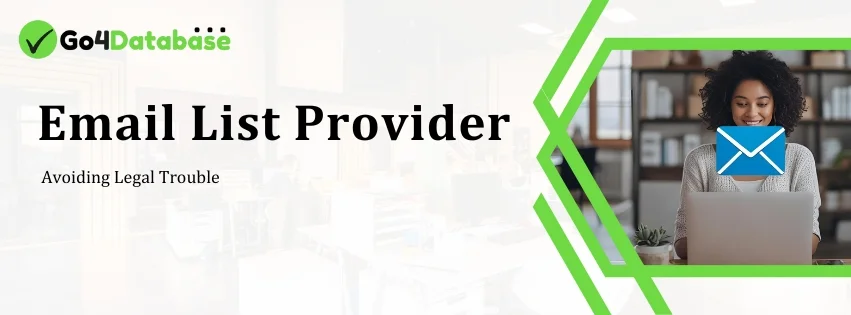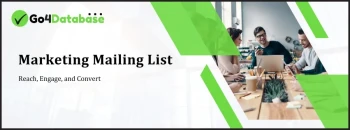Hola, Dear Reader!
Ready to tumble down another thought spiral with me? This time it's about Avoiding Legal Trouble.
So let's start!
Table of Contents: Choosing a Compliant Email List Provider
1. Why does Email list compliance matters?
2. Key laws governing email marketing (GDPR, CAN-SPAM, etc.)
3. Risks of choosing a non-compliant email list provider
4. Features to look for in a compliant email list provider
5. Top Email list provides with strong compliance records
6. Checklist to ensure legal email campaigns
7. Final thoughts on staying safe while scaling
Why Does Email List Compliance Matters?
Email is a direct source of communication between companies and organizations.
This communication contains a handful of personal data and resources that require special rules.
So, conducting rules assists in avoiding any unauthorized actions when emailing.
Email compliance is the practice of adhering to regulations related to email marketing communications, such as:
- The CAN-SPAM Act and CCPA in the U.S.
- GDPR in Europe
- CASL in Canada
Email compliance ensures that businesses respect recipients’ privacy and protect their data.
Key areas of email compliance include:
- Obtaining explicit consent
- Providing clear opt-out options
- Being clear about how you use audience data
Email compliance regulation is the set of legal requirements for email marketing.
It contains laws and regulations to safeguard and protect email privacy and data.
It follows data protection and anti-spam standards that ensure data privacy and security.
Email compliance broadly affects the following matters:
- Information you need to attach
- Who you can send an email
- Subscribers can opt-out easily
Every small and large business should stick to these email marketing rules. It ensures data privacy and security to avoid any kind of illegal emailing act.
Email compliance explains regulations and ensures safe communication between emails.
In addition, several email compliance acts uphold them. All these compliance laws mandate the retention of electronically stored information.
And communications data for a certain period of time (typically 7 years) while sticking to certain levels of data security.
This means that we should protect such email data from unauthorized access.
They store it for a certain amount of time before disposing of it, in case it is required for any legal purpose.
Email compliance laws are vital for email marketers. Following them will help you stay out of legal trouble and build trust with your audience.
Moreover, maintaining email compliance is also instrumental in improving key email marketing metrics such as deliverability, and, indirectly, open and click-through rates.
That is because emails that are compliant with the rules and laws applicable in a given region have a lower probability of being tagged as spam by email providers.
Key laws governing email marketing (GDPR, CAN-SPAM, etc.)
Navigating the digital world seems tricky, especially with data protection and privacy laws specific to each country.
But several key pieces of legislation have laid the foundation for digital privacy and data protection laws worldwide.
These are the CAN-SPAM Act, GDPR, CCPA, and HIPAA.
By following the rules in these laws, email marketers can ensure they’re following the laws that apply to their target audience without worrying about the details of each country’s laws.
| Law | Applies To | Main Focus | Consent Required? | Key Requirement |
| GDPR | Businesses handling EU data | Data protection and privacy | Yes | Clear opt-in, data access rights, data removal |
| CAN-SPAM | US email marketers | Commercial email regulation | No (but opt-out must be easy) | Honest subject lines, unsubscribe option |
| CCPA | Businesses collecting CA data | Consumer data rights in California | Not always | Data disclosure, opt-out of selling info |
| HIPAA | US healthcare providers | Protecting health information | Yes | Securing personal health data (PHI) |
1. CAN-SPAM Act
The Controlling the Assault of Non-Solicited Pornography And Marketing Act is a law in the U.S. that controls emails and other messages sent by businesses, marketers, and nonprofits.
Despite its name, the CAN-SPAM Act doesn’t apply just to bulk email.
It covers all commercial messages, which the law defines as “any electronic mail message, the primary purpose of which is the commercial advertisement or promotion of a commercial product or service,” including email that promotes content on commercial websites.
The law makes no exception for business-to-business email.
Passed in 2003, it is considered one of the first major anti-spam laws.
In layperson’s terms, it serves as a guideline for companies on what they can and can’t do when emailing people.
The Act has several key provisions that companies must adhere to when sending promotional emails.
Without further ado, here are the legal requirements, AKA, the “7 commandments” of the CAN-SPAM Act:
- Thou shalt clearly identify emails as advertisements.
- Thou shalt use truthful and non-deceptive information in all email header fields.
- Thou shalt ensure subject lines accurately reflect the content of the email.
- Thou shalt provide a clear and easily accessible method for recipients to unsubscribe.
- Thou shalt honor opt-out requests within 10 business days.
- Thou shalt include thy valid postal address in all emails.
- Thou shalt ensure compliance with the Act for third-party emails sent on thy behalf
Originally, CAN-SPAM offered guidelines for businesses that want to operate in the U.S. market.
However, it has also become essential for companies with a global audience.
It is the oldest of all compliances, but not as comprehensive as merciless as GDPR.
2. GDPR
The General Data Protection Regulation is a European Union law protecting personal data.
The EU introduced it in 2018 and applied it to anyone who collects, uses, or stores the personal data of EU citizens.
Before moving to the GDPR, it is crucial to understand what personal data is and ways to process it.
Personal data is any information that may identify a living person directly or indirectly.
This includes name, phone number, physical address, email address, preferences, interests, and purchase history. Processing data may include many actions with the client’s data.
This includes collecting, organizing, storing, sharing, and even erasing and destroying data.
Anytime you use and manipulate personal information, you process data.
However, in today’s world, personal data is not just gender, age, name, contact information, ID number, etc., but also all of your digital data, such as
- IP address
- Email address
- Online identifiers (usernames, account numbers)
- Web browsing history
- Cookies and other tracking technologies
- Device identifiers
- Geolocation data
- Social media profiles and interactions
- Online purchases and transaction history
- Digital content preferences
- Search history
- Electronic communication data (chat logs, email contents, and metadata)
The GDPR, like the CAN-SPAM Act, is based on seven principles.
- Be transparent in processing personal data.
- Collect personal data only for specific and legitimate purposes.
- Use only the necessary personal data for the intended purpose.
- Keep personal data accurate and up-to-date.
- Store personal data only for as long as necessary.
- Keep personal data secure and confidential.
- Be accountable for complying with these principles.
However, GDPR also gives people various rights over their personal data, including knowing how it’s used, accessing it, and having it corrected or deleted.
In email marketing, complying with GDPR means ensuring that you have obtained explicit and informed consent from your subscribers before collecting, using, or storing their personal data.
You must also clearly and transparently inform them how their data will be used and enable them to unsubscribe from future emails.
While you don’t necessarily have to include this information in each email you send, you should make it easily accessible via a link to the relevant page.
GDPR is the most rigorous law among all presented to this day.
Whether inside the EU or outside, if you are an EU company that acts globally or you target EU citizens, you must obey this law.
3. CCPA
The California Consumer Privacy Act is a law designed to protect the privacy of people who live in California (the largest state population-wise).
Key provisions:
- Right to know: Consumers can request businesses to disclose what personal information they have collected about them.
- Right to delete: Consumers can ask businesses to delete their personal information.
- Right to opt-out: Consumers can instruct businesses not to sell their personal information.
- Non-discrimination: Businesses can’t discriminate against consumers for exercising their CCPA rights, such as by charging higher prices or providing a lower quality of goods or services.
Furthermore, businesses must explain people’s rights and the types of personal information they collect on their privacy policy page.
The policy must also include clear information on how one can make a request related to their data.
Being CCPA compliant means the following:
- Acknowledging consumer rights
- Transparency
- Data protection
- Process implementation
- Ensuring vendor compliance
However, unlike GDPR, the law applies only to businesses that make over $25 million a year, collect personal information from more than 50,000 people, or earn more than 50% of their revenue from selling people’s personal information.
4. HIPAA
The Health Insurance Portability and Accountability Act is a US federal law enacted in 1996 to protect patient medical information.
The law regulates how healthcare providers and related entities use, store, and share patients’ personal health information.
Under HIPPA, patients have control over their health information and access, review, and amend medical records if needed.
As the healthcare industry evolves, so do the methods for handling this sensitive data, making healthcare software modernization a critical factor in maintaining HIPAA compliance.
HIPAA has two main parts:
- The Privacy Rule: outlines standards for protecting the privacy of individuals’ health information.
- The Security Rule: outlines standards for securing electronically protected health information.
For email marketers, these rules mean that they must comply with HIPAA regulations, which prohibit them from targeting individuals or organizations based on medical information without explicit consent.
Any disclosure of sensitive medical information, e.g. medical billing, patient data, etc, without permission would violate privacy and security.
Therefore, only with consent may advertisers personalize advertisements using medical information.
HIPAA Compliance Requirements
HIPAA compliance requirements must be met by all covered entities and business associates who handle both PHI and ePHI in the United States.
To achieve HIPAA compliance, organisations must address the following requirements:
- Administrative Safeguards: The development of written policies and procedures related to PHI security and privacy, designation of a privacy and security officer, workforce training on HIPAA regulations, and risk analysis and management.
- Physical Safeguards: Controlling access to facilities where PHI is stored, such as ensuring that only authorised personnel can enter secure areas, using security cameras and other security measures, and maintaining proper disposal procedures for any PHI-containing devices or media.
- Technical Safeguards: Ensuring that ePHI is protected through access controls, such as unique user IDs and passwords, encryption of data at rest and in transit, regular security updates and software patching, and monitoring network activity to identify any unauthorised access or data breaches.
- Breach Notification: In a data breach involving PHI, organisations must follow specific procedures to effectively notify affected individuals and the Department of Health and Human Services.
- Business Associate Agreements: Covered entities must establish agreements with their business associates, including provisions requiring them to adhere to HIPAA regulations.
- Privacy Rule: Enforces how covered entities and their business associates use and disclose PHI.
Organisations must set policies and procedures to comply with these regulations, including obtaining individual consent before using or disclosing PHI, implementing reasonable safeguards to protect PHI, and providing individuals with the right to access and request corrections to their PHI.
- Security Rule: A general rule that enforces the requirements above and requires covered entities and business associates to implement administrative, physical, and technical safeguards to protect ePHI from unauthorised access, use, or disclosure.
Risks of choosing a non-compliant Email list provider
it is essential to consider all the risks of picking a partner who does not prioritize compliance in their business relationships.
They would put your organization at risk for penalties and fines and expose you to potential revenue loss, diminished reputation, and security threats.
Risk #1: Legal Consequences
Risk #2: Damage to Brand Reputation
Risk #3: Loss of Revenue
Risk #4: Security Threats
Risk #5: Competitive Disadvantage
Features to look for in a compliant Email list provider
- Supports GDPR, CAN-SPAM, and other regional email marketing laws
- Offers clear double opt-in functionality to ensure valid subscriber consent
- Provides easy unsubscribe options to stay compliant and user-friendly
- Maintains detailed subscriber records for proof of consent and legal audits
- Includes automated compliance tools like consent tracking and data export
- Regularly updates security features to protect subscriber data
- Enables list segmentation to avoid sending irrelevant or unsolicited emails
- Has built-in spam filter checks to improve deliverability and reduce violations
- Offers customizable privacy and consent forms
- Clearly outlines their own data usage and privacy policies
Top Email list providers with strong compliance records
1. Go4Database
Go4Database is a B2B data provider based in India. It has a major focus on clients across the U.S. and Canada.
It helps businesses find contact details of potential clients across different industries.
Unlike tools like Mailchimp or ConvertKit, it's not used for sending emails but for list building email lists.
Compliance-wise, it follows ethical data sourcing rules. It follows GDPR, CCPA, CAN-SPAM AND HIPAA.
Go4Database handles consent or opt-ins, so the responsibility lies with Go4Database.
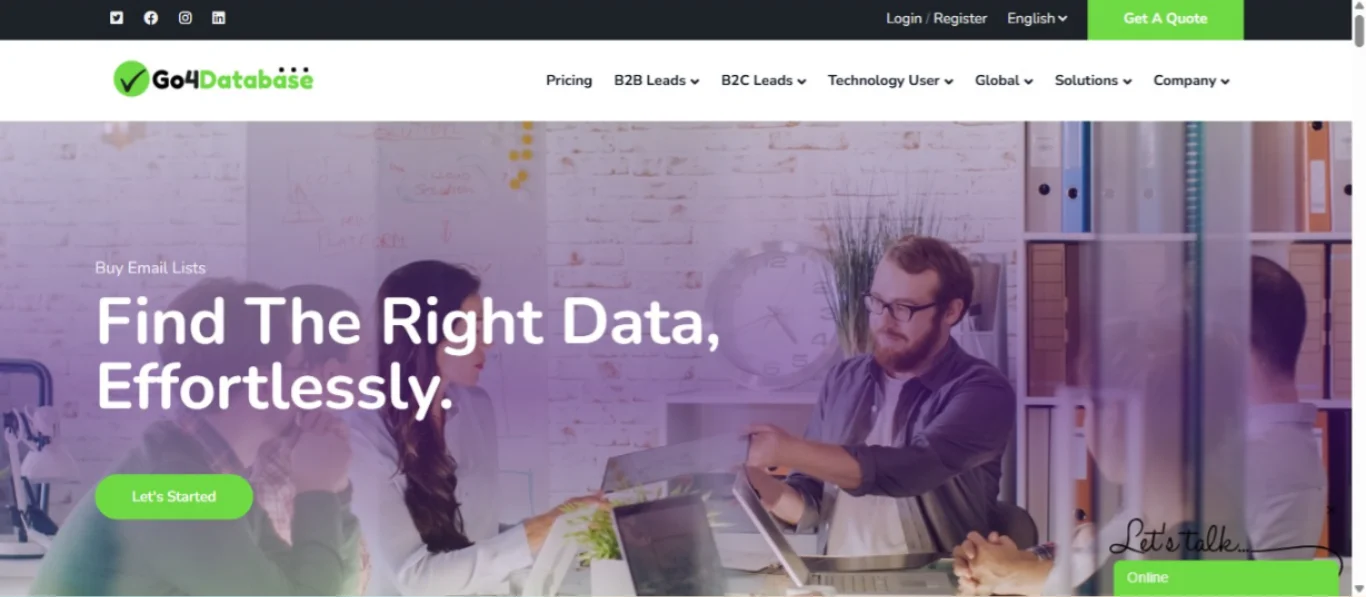
Key features:
- Industry-specific contact filtering
- Custom data lists based on your needs
- Bulk contact access for faster outreach
It's useful for fast lead generation, but make sure you use the data with a compliant email tool.
2. Mailchimp
Mailchimp is a well-known email marketing platform. It's easy to use and very beginner-friendly.
More importantly, it's highly focused on legal compliance.
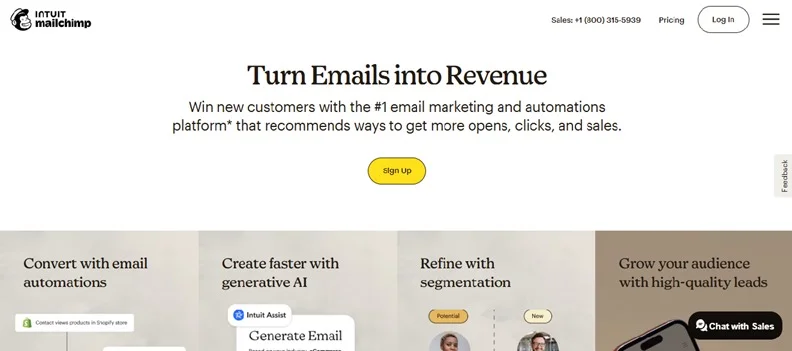
It supports laws like GDPR, CAN-SPAM, and CCPA. You get:
- Double opt-in options
- Easy unsubscribe buttons
- Consent tracking and signup forms
It’s a great choice for small and growing businesses that want both features and peace of mind.
3. ConvertKit
ConvertKit is made for content creators, freelancers, and bloggers. It's simple and helps you send emails to people who truly want to hear from you.
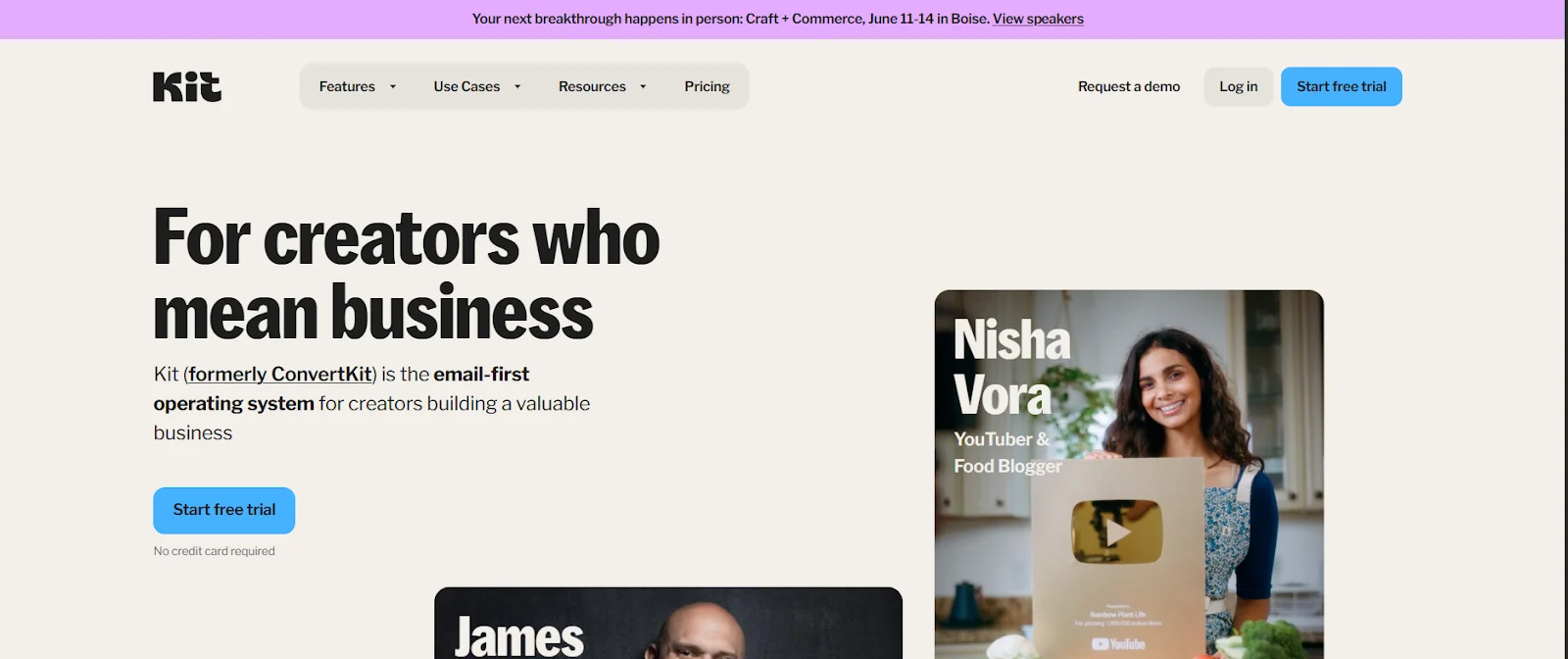
It follows privacy laws by offering:
- GDPR-friendly signup forms
- Subscriber tagging and filters
- Automation flows based on permission
ConvertKit helps you grow your list slowly but legally, which is exactly what long-term success needs.
4. Cognism
Cognism is a sales intelligence platform that gives you verified business contact data. It’s very popular in Europe and focuses on doing things legally.
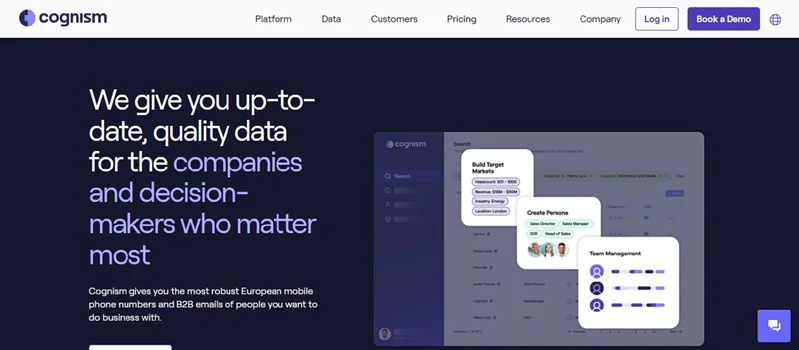
What makes Cognism different:
- All data is GDPR and CCPA compliant
- Real-time contact verification
- Consent-based sourcing and full audit trails
It’s best for B2B sales leads teams that need solid, risk-free data, especially in strict industries like finance.
5. Kaspr
Kaspr is a tool for finding contact details, mainly from LinkedIn. It’s fast and helpful for salespeople who need direct contact info.
It says it follows GDPR rules by using public data and giving people the chance to opt out.
Still, marketers need to double-check before sending emails.
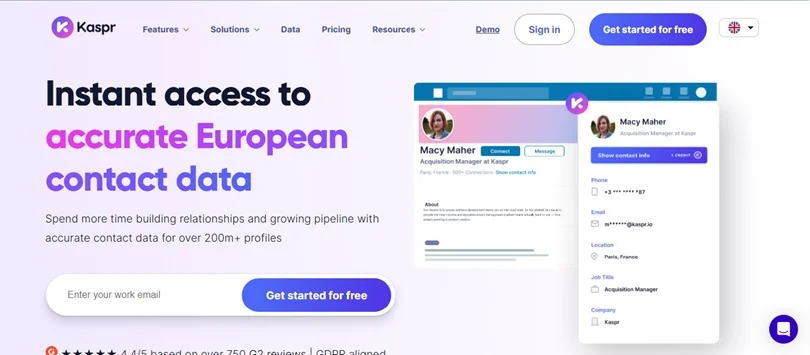
Features include:
- LinkedIn Chrome extension
- Instant email and phone access
- CRM integrations and automated workflows
Use it smartly, and always with respect for privacy laws.
Checklist to ensure legal email campaigns
1. Get clear permission before emailing anyone. Use opt-in forms and avoid buying email list.
2. Use double opt-in when possible. This confirms that subscribers truly want your emails.
3. Show who the email is from. Use your real name or business name. Avoid fake sender info.
4. Include your physical business address in every email.
5. Add an unsubscribe link that works. Make it easy to find. Do not hide it in fine print.
6. Remove unsubscribed users quickly. Don’t wait days. Respect their choice.
7. Keep records of subscriber consent. Note when and how they joined your list.
8. Only send relevant content. Don’t trick users with clickbait or unrelated offers.
9. Avoid spammy subject lines. Stay away from “Free!!!” and “100% guaranteed” type language.
10. Don’t use scraped or third-party lists unless they’re verified and permission-based.
11. Encrypt and protect subscriber data. Use secure email tools and platforms.
12. Regularly clean your email list. Remove inactive or bounced contacts.
13. Review local laws like GDPR, CAN-SPAM, and CCPA before launching global campaigns.
14. Use tools that offer compliance support. Many platforms help with privacy settings.
15. Include a privacy policy link in your emails. Let subscribers know how their data is used.
Following this checklist keeps your email marketing clean, legal, and respectful. It also helps build trust with your audience, which is the real win.
Final thoughts on staying safe while scaling
Scaling your business email list feels exciting. But it should never come at the cost of compliance.
Legal issues can ruin your reputation and your business. So, grow your list the right way.
Always ask for permission before sending any emails. Use clear, honest opt-in forms.
Never buy or use random lists, no matter how tempting they seem. Choose platforms that support privacy laws like GDPR, CAN-SPAM, and CCPA.
These tools make it easier to stay compliant. Make sure every email has your name, your business address, and an easy way to unsubscribe.
That’s not just best practice, it's the law. Keep records of how and when people joined your list.
If someone asks, you should be able to prove their consent. Stay away from clickbait subject lines.
Be honest and clear in your messaging. Protect your subscribers’ data. Use secure tools and update passwords regularly.
Compliance is not a one time task. Laws change, and so should your approach. In the end, the safest growth is slow, steady, and respectful.
Build trust, deliver value, and your list will grow with loyal, happy readers. That’s how you scale safely and smartly.
FAQs:
1. Can I buy email lists and still be compliant?
No. Most bought lists don’t have user consent and can lead to legal issues.
2. What laws do I need to follow for email marketing?
It depends on where your audience is. Common ones are GDPR, CAN-SPAM, and CCPA.
3. How do I prove someone gave me consent?
Keep records of sign-up time, method, and IP address from your email platform.
4. Is double opt-in necessary?
Not always, but it’s a safe and reliable way to confirm true interest.
